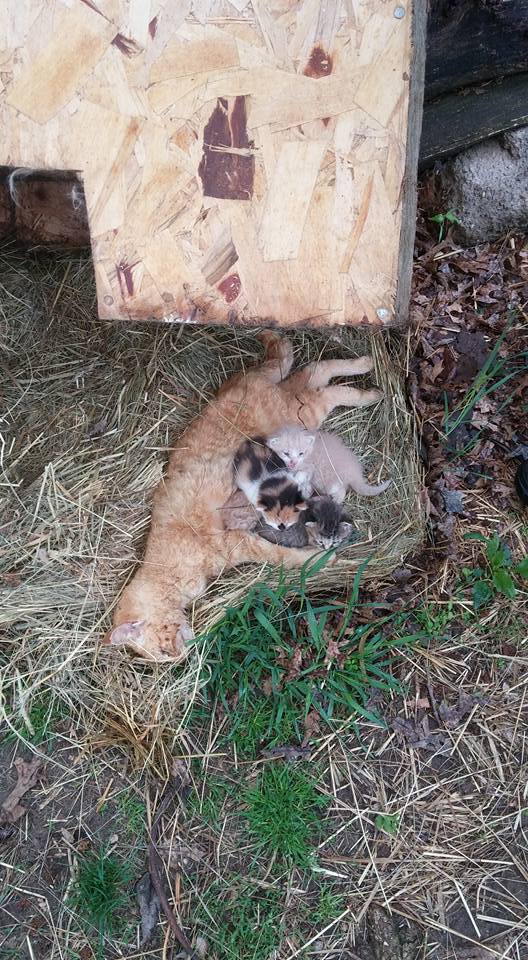(Editor’s note: This story, written in the first person by St. Joseph resident Kari Cedergren, came to the attention of the Newsleader via the Tri-County Humane Society. The Newsleader decided to publish it because it points to a serious animal-welfare problem, and it’s a heartwarming example of how people, working together, can help save suffering animals.)
In May 2016, my realtor and friend, Rebecca from Cartwright Realty, contacted me about a property her clients wanted to buy. But there was an issue. The clients would not close on the property unless the community of accumulated cats was removed. The selling realtor was supposed to “take care” of the animals but had not.
With only weeks left until closing, Rebecca took matters into her own hands. She estimated there were 50 cats in this colony that needed homes – and fast. As an animal lover, volunteer and sustaining patron of the Tri-County Humane Society and Minnesota Horse Welfare Coalition, I wanted to help my friend, Rebecca, and save some feline lives.
A saintly soul, Susan, the property’s owner, loved her outdoor cats. She built shelters for them in old sheds and filled them with mattresses, blankets and straw. She housed and fed her furry friends, and they were fruitful and multiplied. Susan never considered what might happen when she was no longer able to care for them herself. When she had to be moved into a nursing home, her beloved colony of cats had to fend for themselves.
Not surprisingly, the situation went from bad to worse for the poor cats. Rebecca caught most of them and placed them with various humane agencies. Of the 50 cats, 45 or so were saved; some who were dying had to be “put down.” Thankfully, there are local organizations to help concerned citizens do what is best for unwanted animals. Tri-County Humane Society does incredible work in the St. Cloud area. Its building is small, but the staff and many volunteers help the same number of animals as in institutions twice the size. Through a few phone calls and some coordination, TCHS helped with the majority of Susan’s cats. The kittens and a few more of the friendlier cats were adopted out as house cats, and a large number were placed through TCHS’ Barn Cat program. The Barn Cat program places cats that are unfit to live indoors for various reasons. These cats are spayed or neutered by the humane society. They go on to live fruitful lives but do not multiply.
Obviously, there are costs to spay and neuter animals. I wanted to find a way to help cover some of TCHS’ costs for fixing Susan’s cats. Feline Rescue in St. Paul is a nonprofit that has three programs: Adoption, Foster, Outreach. The focus of the Outreach Program is to help concerned citizens cover some of the costs associated with trapping, neutering and returning outdoor cats back into the community. The Outreach Program of Feline Rescue is supported by donations, grants and volunteer hours. Grant money the Outreach Program received from Chuck & Don’s Pet Food & Supplies was used to help cover a portion of the cost of spaying/neutering Susan’s cats.
Twenty-five years ago, cats and kittens like Susan’s would have been destroyed. Thanks to the dedication of the Tri-County Humane Society and the willingness of the Outreach Program at Feline Rescue to share their grant money from Chuck & Don’s Pet Food & Supplies, Susan’s cats are now enjoying life in their new locations. Those 50 cats, however, point to a much bigger problem in the State of Minnesota. There are many, many more cat colonies that are being fed by concerned citizens like Susan, and the task of trapping, neutering and returning them – or better yet, finding them indoor homes – is a large one.
If you’d like to take action by adopting, donating, volunteering or fostering an animal in transition to a new home, please contact the Tri-County Humane Society by visiting its website www.tricountyhumanesociety.org or by calling 320-252-0896. If you would like to donate to the Trap Neuter Return program for colony cats through Feline Rescue’s Outreach Program, please visit its website at www.felinerescue.org or call 651-642-5900. Please designate your donation to “Outreach Program.”
Through awareness, concerned citizens now have more humane options for handling outdoor cats. We help animals and so can you.

Three cats huddle together in a corner of the abandoned “cat colony.”

A severely undernourished and exhausted kitten sprawls as her kittens try to get milk from her. These were just some of the 50 cats left abandoned at a “cat colony” when personal circumstances caused the residence’s owner to leave the premises.

Kari Cedergren




